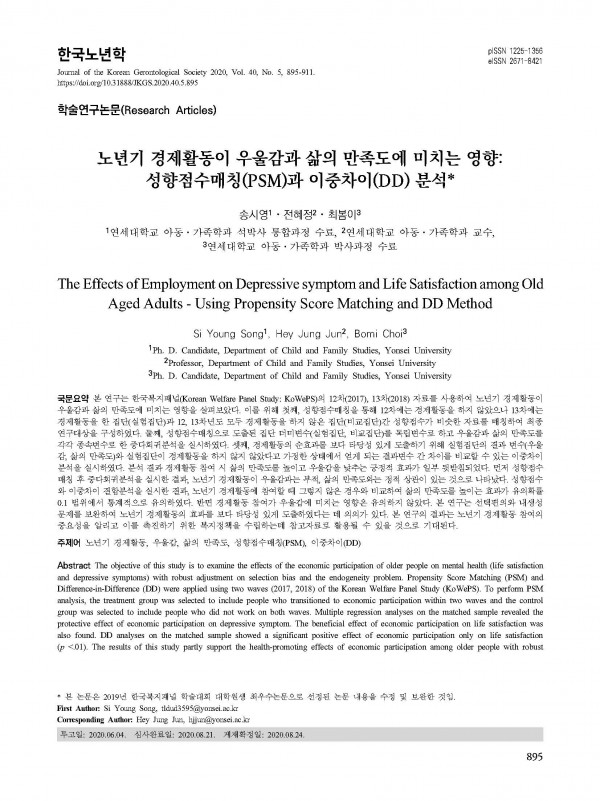논문 | 노년기 경제활동이 우울감과 삶의 만족도에 미치는 영향: 성향점수매칭(PSM)과 이중차이(DD) 분석
페이지 정보
작성자 관리자 작성일21-03-31 14:11 조회676회 댓글0건관련링크
본문
송시영, 전혜정, 최봄이. (2020). 노년기 경제활동이 우울감과 삶의 만족도에 미치는 영향:성향점수매칭(PSM)과 이중차이(DD) 분석. 한국노년학, 40(5), 895-911.
DOI: https://doi.org/10.31888/JKGS.2020.40.5.895
ABSTRACT
본 연구는 한국복지패널(Korean Welfare Panel Study: KoWePS)의 12차(2017), 13차(2018) 자료를 사용하여 노년기 경제활동이 우울감과 삶의 만족도에 미치는 영향을 살펴보았다. 이를 위해 첫째, 성향점수매칭을 통해 12차에는 경제활동을 하지 않았으나 13차에는 경제활동을 한 집단(실험집단)과 12, 13차년도 모두 경제활동을 하지 않은 집단(비교집단)간 성향점수가 비슷한 자료를 매칭하여 최종 연구대상을 구성하였다. 둘째, 성향점수매칭으로 도출된 집단 더미변수(실험집단, 비교집단)를 독립변수로 하고 우울감과 삶의 만족도를 각각 종속변수로 한 중다회귀분석을 실시하였다. 셋째, 경제활동의 순효과를 보다 타당성 있게 도출하기 위해 실험집단의 결과 변수(우울감, 삶의 만족도)와 실험집단이 경제활동을 하지 않지 않았다고 가정한 상태에서 얻게 되는 결과변수 간 차이를 비교할 수 있는 이중차이 분석을 실시하였다. 분석 결과 경제활동 참여 시 삶의 만족도를 높이고 우울감을 낮추는 긍정적 효과가 일부 뒷받침되었다. 먼저 성향점수 매칭 후 중다회귀분석을 실시한 결과, 노년기 경제활동이 우울감과는 부적, 삶의 만족도와는 정적 상관이 있는 것으로 나타났다. 성향점수와 이중차이 결합분석을 실시한 결과, 노년기 경제활동에 참여할 때 그렇지 않은 경우와 비교하여 삶의 만족도를 높이는 효과가 유의확률 0.1 범위에서 통계적으로 유의하였다. 반면 경제활동 참여가 우울감에 미치는 영향은 유의하지 않았다. 본 연구는 선택편의와 내생성 문제를 보완하여 노년기 경제활동의 효과를 보다 타당성 있게 도출하였다는 데 의의가 있다. 본 연구의 결과는 노년기 경제활동 참여의 중요성을 알리고 이를 촉진하기 위한 복지정책을 수립하는데 참고자료로 활용될 수 있을 것으로 기대된다.
The objective of this study is to examine the effects of the economic participation of older people on mental health (life satisfaction and depressive symptoms) with robust adjustment on selection bias and the endogeneity problem. Propensity Score Matching (PSM) and Difference-in-Difference (DD) were applied using two waves (2017, 2018) of the Korean Welfare Panel Study (KoWePS). To perform PSM analysis, the treatment group was selected to include people who transitioned to economic participation within two waves and the control group was selected to include people who did not work on both waves. Multiple regression analyses on the matched sample revealed the protective effect of economic participation on depressive symptom. The beneficial effect of economic participation on life satisfaction was also found. DD analyses on the matched sample showed a significant positive effect of economic participation only on life satisfaction (p <.01). The results of this study partly support the health-promoting effects of economic participation among older people with robust statistical methods that control selection bias and the endogeneity problem. The findings of this research have important implications for strengthening policy interventions on job creation projects for older people.
